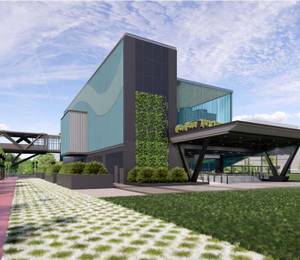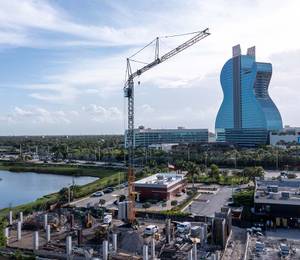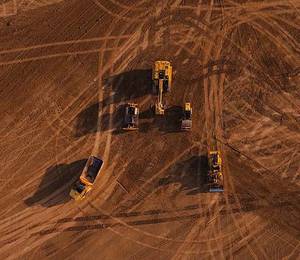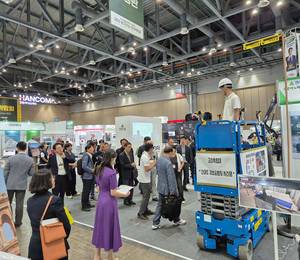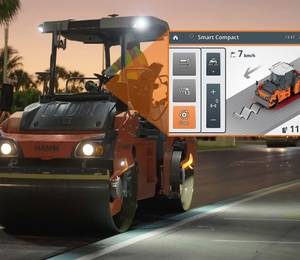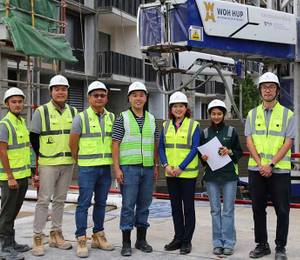The Airport Authority Hong Kong (AA) has unveiled the Airport City vision, a blueprint that entails an investment of over HK$40 billion for 10 years until 2030 at Hong Kong International Airport (HKIA). It is aimed to enhance the airport’s capacity and functionality, while transforming it into a new landmark and propelling the economic development of Hong Kong and the region.
“The AA first put forward the Airport City vision and blueprint in May last year. We are very glad that the HKSAR government supports the development of Airport City, which aims to fully capitalise on the unique geographical advantage of HKIA and capture opportunities arising from new infrastructures,” said Fred Lam, CEO of the AA.
“The core functions of the airport and related industries are organically and seamlessly integrated into the fabric of the Airport City, unleashing a strong synergy. The various mid- and long-term developments in our blueprint will strengthen HKIA as an international aviation hub and create a new landmark for Hong Kong.”
The AA has been continuously enhancing airport facilities. Ongoing works include the refurbishment of boarding gates and other facilities in the terminal; construction of the Sky Bridge to connect Terminal 1 and North Satellite Concourse; and leveraging technology to enhance passenger services. Smart airport initiatives such as e-security gates and e-boarding gates, HKG My Flight mobile application, and deploying robots in the terminal enrich passenger experience. The 5G infrastructure and digital apron management system will further improve operational efficiency.
HKBCF Island project
The AA’s proposals for the development of the Hong Kong Boundary Crossing Facilities (HKBCF) Island of Hong Kong-Zhuhai-Macao Bridge (HZMB) focus on enhancing HKIA’s services and development as part of the Airport City strategy.
The government has accepted the AA’s plan to develop automated car parks on the HKBCF Island that will provide around 6,000 parking spaces in phases. The ‘Park and Fly’ and ‘Park and Visit’ carparks will cater to air transfer passengers and visitors respectively.
The Park and Fly passengers will transfer to HKIA boarding gates directly from the HKBCF restricted area, facilitated by a bonded vehicular bridge connected to the airport’s Intermodal Transfer Terminal, without having to go through immigration procedures in Hong Kong.
The Park and Visit visitors may go from HKBCF to SkyCity or to other parts of Hong Kong on Airport City Link, a vehicular and pedestrian bridge. The AA plans to introduce an autonomous transportation system on the Airport City Link to connect HKBCF Island and SkyCity, and extend the system to Tung Chung town centre.
The AA also plans to develop a new campus and dormitory of the Hong Kong International Aviation Academy on the HKBCF Island, while land parcels have been reserved for future air cargo developments.
SkyCity and AWE Phase II
SkyCity is an integral part of the Airport City vision, of which, ‘11 Skies’ developed by New World Development, will be Hong Kong’s largest integrated complex for retail, dining and entertainment facilities. The 11 Skies project will be completed in phases from 2022 to 2025, introducing over 800 shops and Hong Kong’s largest indoor entertainment area. There will be three Grade A office buildings as well. Regal Hotels International’s Regala Skycity Hotel is scheduled for completion next year, providing around 1,200 rooms.
The Phase II development of AsiaWorld-Expo (AWE) will house the largest indoor performance venue in Hong Kong, which accommodates up to 20,000 people. Upon completion, the total gross floor area of AWE’s exhibition facilities will increase to 100,000 sq m. In addition, more hotels and office buildings are planned to be developed within SkyCity in the future.
Air cargo development
HKIA has reportedly been ranked the world’s busiest international cargo airport for 10 consecutive years since 2010, and the AA is taking forward intermodal cargo initiatives to consolidate its leadership position.
The AA is planning to set up a HKIA Logistics Park in Dongguan and an airside intermodal cargo handling facility at HKIA, with a view to creating a brand new mode of cargo business, increasing cargo handling volume at HKIA, and serving as a growth engine for the industry.
With the new facilities in operation, customs clearance, security screening, palletisation, cargo acceptance and other services for Mainland (China) exports could be completed in Dongguan before shipping the goods to the cargo handling facility in the restricted area of HKIA by sea, for air trans-shipment to worldwide destinations.
For imports to the Mainland, the goods could be directly shipped from the HKIA restricted area to Dongguan. The AA said the procedures will comply with Hong Kong’s air cargo security regulations, and next year a pilot scheme will trial the operations between Hong Kong and Dongguan.
Meanwhile, the strategy to develop the high-value, high-growth logistics segments continues, covering temperature-controlled cargo such as medicine and vaccines, and e-commerce. A premium logistics centre at the airport is being developed by a joint venture led by Cainiao Network, a subsidiary of Alibaba Group, which is expected to add 1.7 mil t of cargo volume to HKIA each year. Moreover, the expansion of DHL’s Central Asia Hub is expected to increase its capacity by 50% to 1.06 mil t.
Collaboration with Zhuhai airport
The commissioning of the HZMB has significantly shortened the distance between HKIA and Zhuhai Airport. The two airports have agreed to explore deeper collaboration and formulate long-term development plans to complement each other’s strengths. The AA’s proposed injection of equity into Zhuhai Airport is expected to pave the way for long-term and extensive collaboration between the two airports. Details of future collaboration will be discussed between the two sides.
Mr Lam explained, “Our goal is not only to complement each other on the basis of our existing flight networks, but set sight on over 160 airports in the Mainland which have no international border facilities, and over 130 new airports under construction. We aim to attract passengers from those markets to Zhuhai Airport, and onward to HKIA via HZMB for international air travels. This is an enormous potential source of passengers. In parallel, strengthening collaboration with Zhuhai will extend our air cargo services to the broader inland markets. These new sources of business will benefit our business partners, in particular the airlines and logistics industry.”
Images: Airport Authority Hong Kong
